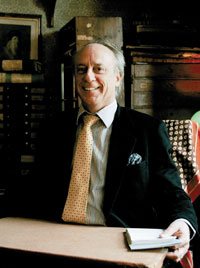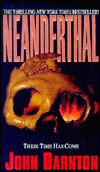
| NYWI HOME PAGE | VISITING WRITERS & EVENTS INDEX | VIDEO ARCHIVES |
 |
Journalist and novelist
NYS Writers Institute, December 1, 2005
4:15 p.m. Seminar | Standish Room, Science Library, Uptown Campus
8:00 p.m. Reading | Recital Hall, Performing Arts Center, Uptown Campus
Introduction by William Kennedy
PROFILE
 John Darnton is a bestselling science fiction author, as well as a Pulitzer Prize-winning former New York Times foreign correspondent. His newest book is the mystery novel, The Darwin Conspiracy (2005), a re-imagining of the voyage of The Beagle, and a clever solution to a major historical puzzle: why it was that Charles Darwin hesitated to publish his most important work, The Origin of Species for 22 years. Darnton transports the reader to Victorian England, the Galapagos Islands, and around the world on a quest to discover the "true" origins of the Theory of Evolution. Characters include Darwin himself; his youngest daughter Lizzie (a budding Victorian feminist); and two modern-day field scientists, Hugh Kellum and Beth Dulcimer, as they unearth the surprising secrets of Darwin's life.
John Darnton is a bestselling science fiction author, as well as a Pulitzer Prize-winning former New York Times foreign correspondent. His newest book is the mystery novel, The Darwin Conspiracy (2005), a re-imagining of the voyage of The Beagle, and a clever solution to a major historical puzzle: why it was that Charles Darwin hesitated to publish his most important work, The Origin of Species for 22 years. Darnton transports the reader to Victorian England, the Galapagos Islands, and around the world on a quest to discover the "true" origins of the Theory of Evolution. Characters include Darwin himself; his youngest daughter Lizzie (a budding Victorian feminist); and two modern-day field scientists, Hugh Kellum and Beth Dulcimer, as they unearth the surprising secrets of Darwin's life.
"Darnton expertly builds suspense…" [and praised the book for its] "thrilling fast pace and intrigue, meticulous research, and strong character development…." - Booklist
". . . Darnton puts real passion into his historical imaginings and recreations . . ." - Publishers Weekly
 Darnton's other books include Mind Catcher (2002), a medical thriller about artificial intelligence; The Experiment (1999), a sci-fi suspense tale about cloning; and Neanderthal (1996), a major bestseller about the rediscovery of two lost tribes of primitive humans.
Darnton's other books include Mind Catcher (2002), a medical thriller about artificial intelligence; The Experiment (1999), a sci-fi suspense tale about cloning; and Neanderthal (1996), a major bestseller about the rediscovery of two lost tribes of primitive humans.

"hurtles along, hightailing it nimbly around every sharp corner of technical knowledge and scientific research." - Chicago Tribune on Mind Catcher
"one of the summer's scariest novels" - New York Daily News on The Experiment
"Imaginative, entertaining, intelligent...such fun reading" - San Francisco Chronicle on Neanderthal
As a New York Times reporter stationed in Nigeria and Kenya, Darnton received a 1979 George Polk Award for his coverage of Africa. That same year, he became Bureau Chief in Warsaw, and, in 1982, received the Pulitzer Prize and a second George Polk Award for his coverage of the Solidarity Movement. Darnton has also served the Times as Bureau Chief in Madrid and London, Deputy Foreign Editor, Metro Editor, News Editor, and Culture Editor.